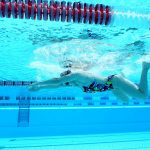Why do you swim?
There are many reasons why we take part in our favourite sport.
Some people want to keep fit, others want to train with their old friends, and yet others want to prove they are the best. Everybody has their own reason.
In psychology, motivation tends to be divided into intrinsic motivation (“I swim because I love swimming”) or extrinsic motivation (“I swim to be a winner.”). As well as being qualitatively different, motivation can also vary quantitively from person to person. So, there are cases of people with absolutely no motivation (unmotivated athlete) and others with a very high level of motivation. Plenty of research has shown there is a correlation between having a high level of intrinsic motivation and a long career in sport.
According to one of the most important theories about motivation, i.e. self-determination theory (Deci and Ryan, 2000), there are three basic needs we all focus on and that indicate the presence of intrinsic motivation.
These three needs are:
- the need for autonomy;
- the need for competence;
- the need for relatedness.
If accompanied by certain factors, sports can manage to satisfy all three of these needs.
Indeed, in the specific case of swimming, the need for autonomy comes from the possibility of learning to swim and being autonomous in an element like water. But that is not all: in the case, for example, of young people, the kind of organisation required to get their kit ready, go to the pool, change and come home at the end of their swimming session, also helps meet the need for autonomy.
Swimming also contributes to meeting the need for competence in the sense that we learn new skills associated with the water. And, of course, if we are in good company, we also satisfy our need for relatedness.
All this information should help us understand which factors associated with a swimming pool can motive us: a pool and sporting environment that bring out these factors will be a place where motivated swimmers go.
As we gradually gain confidence with the swimming pool environment, our needs are met with even greater satisfaction that will lead to behaviour guided by increasingly high motivation. This explains why it takes plenty of motivation to have the dedication to be a competitive athlete.
What can we learn from this information?
First and foremost, that listening to our own motivation, regardless of whether it is high or low, intrinsic or extrinsic, is an important mental exercise for understanding why we regularly go (or do not go) to such a potentially enriching place as a swimming pool and, hence, take part in some kind of motor activity.
Secondly, it will teach us how to choose a pool that satisfies our motivation and, hence, encourages us to keep up our favourite physical-sporting activity.







